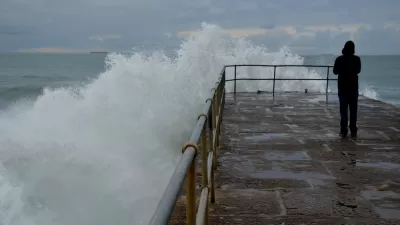Add this one to the "This is how they spend my tax dollars?!" file. Scott Huler exposes a ploy by legislators from 20 coastal North Carolina counties to outlaw effectively measuring and predicting the potential rise in sea level.
In an effort to head off the supposed harm to economic development caused by the likely 1-meter rise is sea levels by 2100 reported by a state-appointed science panel, the legislators have circulated Replacement House Bill 819.
According to Huler, "The key language is in section 2, paragraph e, talking about rates of sea level rise: 'These rates shall only be determined using historical data, and these data shall be limited to the time period following the year 1900. Rates of seas-level rise may be extrapolated linearly. ' It goes on, but there's the core: North Carolina legislators have decided that the way to make exponential increases in sea level rise – caused by those inconvenient feedback loops we keep hearing about from scientists – go away is to make it against the law to extrapolate exponential; we can only extrapolate along a line predicted by previous sea level rises."
"Which, yes, is exactly like saying, do not predict tomorrow's weather based on radar images of a hurricane swirling offshore, moving west towards us with 60-mph winds and ten inches of rain. Predict the weather based on the last two weeks of fair weather with gentle breezes towards the east. Don't use radar and barometers; use the Farmer's Almanac and what grandpa remembers."
Writing in the Charlotte Observer, Bruce Henderson reports that, "NC-20 Chairman Tom Thompson, economic development director in Beaufort County, said his members – many of them county managers and other economic development officials – are convinced that climate changes and sea-level rises are part of natural cycles. Climate scientists who say otherwise, he believes, are wrong."
Thanks to Kelly Bennett
FULL STORY: NC Considers Making Sea Level Rise Illegal

Maui's Vacation Rental Debate Turns Ugly
Verbal attacks, misinformation campaigns and fistfights plague a high-stakes debate to convert thousands of vacation rentals into long-term housing.

Planetizen Federal Action Tracker
A weekly monitor of how Trump’s orders and actions are impacting planners and planning in America.

Chicago’s Ghost Rails
Just beneath the surface of the modern city lie the remnants of its expansive early 20th-century streetcar system.

Bend, Oregon Zoning Reforms Prioritize Small-Scale Housing
The city altered its zoning code to allow multi-family housing and eliminated parking mandates citywide.

Amtrak Cutting Jobs, Funding to High-Speed Rail
The agency plans to cut 10 percent of its workforce and has confirmed it will not fund new high-speed rail projects.

LA Denies Basic Services to Unhoused Residents
The city has repeatedly failed to respond to requests for trash pickup at encampment sites, and eliminated a program that provided mobile showers and toilets.
Urban Design for Planners 1: Software Tools
This six-course series explores essential urban design concepts using open source software and equips planners with the tools they need to participate fully in the urban design process.
Planning for Universal Design
Learn the tools for implementing Universal Design in planning regulations.
planning NEXT
Appalachian Highlands Housing Partners
Mpact (founded as Rail~Volution)
City of Camden Redevelopment Agency
City of Astoria
City of Portland
City of Laramie





























